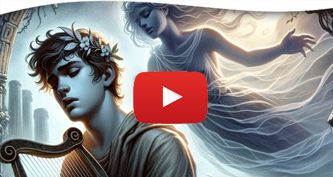Wednesdays, 7:00 – 8:15 p.m. CT
May 8 – 29 (4 classes)
TS Members: $60 • Nonmembers: $75
 The influence of the Orphic hymns on Western culture is constant and profound. In this tour of mystical mythology and magical art, author and metaphysical scholar Ronnie Pontiac will examine the myths surrounding Orpheus, his adventures as a singer and spiritual guide, the role of Orpheus in the emergence of modern Western esotericism and the counterculture, and whether there really was an Orpheus at all.
The influence of the Orphic hymns on Western culture is constant and profound. In this tour of mystical mythology and magical art, author and metaphysical scholar Ronnie Pontiac will examine the myths surrounding Orpheus, his adventures as a singer and spiritual guide, the role of Orpheus in the emergence of modern Western esotericism and the counterculture, and whether there really was an Orpheus at all.
Registration includes on-demand access to recordings of all the classes, which can be viewed for two weeks following the date of the final class. Late registrants will receive recording links to all missed sessions for on-demand viewing.
See below for a full course syllabus.
Course Topics:
Week One: The Four Elemental Myths of Orpheus
- His adventures as a singer and spiritual guide on the first tour bus in Western history, the Argo, as one of the Argonauts.
- The trip to the underworld to resurrect his wife after she was murdered on their wedding day, and the tragic backward glance that may be the first story of romantic heartbreak and loss in the Western canon. Also, the evolution of Eurydice.
- The songs Orpheus sang at dawn to Apollo, and Apollo’s mercy: the revelation of sacred mysteries.
- The murder of Orpheus at the hands of the maenads; his head, saved by Apollo, gave prophecies at a shrine where nightingales were said to sing the sweetest.
Week Two: The Root of Western Countercultures
We’ll trace the awe-inspiring influence of the Orphic myths and Orphic hymns, which have reappeared repeatedly as sources of inspiration. The Italian Renaissance began with Marsilio Ficino singing the hymns to his friends, who included Leonardo da Vinci, Lorenzo the Magnificent, Botticelli, and Pico della Mirandola. From Agrippa and the 17th century Rosicrucians to Madame Blavatsky, from Cocteau and Kerouac to “Hadestown,” Orpheus influenced early Christianity, western esotericism, opera, theater, fine arts, rock music, the troubadour tradition, comic books, poetry, and literature.
Week Three: The Golden Leaves or Death Passports and Orphic Ideas About the Afterlife
Controversy surrounds these artifacts, some very recently discovered. Gold leaves, sometimes in the form of a leaf, on which words were inscribed meant to be spoken by the deceased with the promise of escape from the weary wheel of grief. In the Homeric world after death the average person was reduced to a voiceless shadow in the underworld, animal sacrifices were demanded by the gods, and great warriors like Achilles were the ideal. The Orphic mysteries rejected all that and offered a revolutionary new idea: personal salvation by remembering who we are.
Week Four: Orpheus, Pythagoras, and Plato
Was there an Orpheus, or was it all a literary invention? Did Pythagoras invent Orpheus? Was Orpheus of Croton the pen name of Pythagoras? Who influenced Pythagoras if he did create the Orphic myths? Which leads us to a key question: why did Pythagoras wear pants? We’ll look at Persian, Babylonian, Zoroastrian, Egyptian, Hittite, and Vedic similarities to Orphic beliefs about life and the afterlife. And what about Plato?
 Ronnie Pontiac worked as Manly P. Hall’s research assistant, screener, and designated substitute lecturer for seven years. He is the author and co-author of a trilogy about metaphysical countercultures in Western Esotericism published by Inner Traditions: American Metaphysical Religion: Esoteric and Mystical Traditions of the New World (2023) and The Magic of the Orphic Hymns: A Translation for the Modern Mystic (2023), co-authored with Tamra Lucid. A third volume about the political and social context of Rosicrucian origins will be published in 2024. Ronnie has produced award-winning documentaries and written for many publications. Guitarist for the experimental rock band Lucid Nation, he lives in Los Angeles with his wife Tamra Lucid.
Ronnie Pontiac worked as Manly P. Hall’s research assistant, screener, and designated substitute lecturer for seven years. He is the author and co-author of a trilogy about metaphysical countercultures in Western Esotericism published by Inner Traditions: American Metaphysical Religion: Esoteric and Mystical Traditions of the New World (2023) and The Magic of the Orphic Hymns: A Translation for the Modern Mystic (2023), co-authored with Tamra Lucid. A third volume about the political and social context of Rosicrucian origins will be published in 2024. Ronnie has produced award-winning documentaries and written for many publications. Guitarist for the experimental rock band Lucid Nation, he lives in Los Angeles with his wife Tamra Lucid.
Program Format
This is a live, interactive online program that will also be recorded. Our goal is to send recordings to you within two business days, often sooner. Recordings will be available for on-demand viewing for two weeks following the date of the final class.
Software Platform
Zoom for Windows, Mac, or mobile device; minimum recommended network bandwidth 1.5 Mbps. Please download Zoom for free at zoom.us/download, and test your connection at zoom.us/test. New to Zoom? Check out http://www.theosophical.org/FAQ. Please email webinars@theosophical.org for further information.


